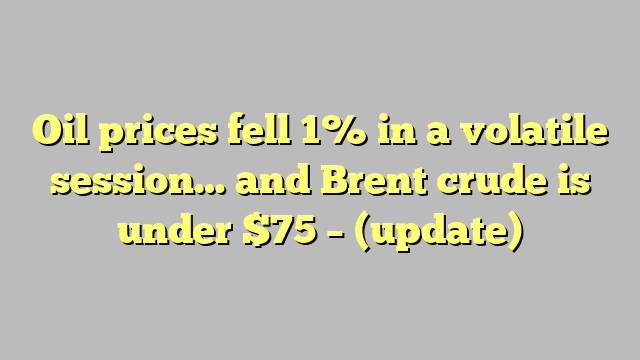Oil prices fell at the end of trading today, Monday, July 3 (2023), after a volatile session, after rising during trading, amid fears of a supply shortage after Saudi Arabia’s decision to extend the voluntary cut for the month of August.
And Saudi Arabia announced the extension of the voluntary cut of one million barrels per day, which began in July, for another month, to include the month of August, with the possibility of extending it again.
Oil prices had started the morning trading on a decline amid fears of an economic recession that might affect demand in light of the continuation of central banks in implementing their strict policy of raising interest rates.
Oil prices today
At the end of the session, Brent crude futures – for September 2023 delivery – fell by 1%, to reach $74.65 a barrel.
US West Texas Intermediate crude futures – August 2023 delivery – also fell by 1.2%, to $69.79 a barrel, according to figures seen by the specialized energy platform.
And oil prices ended their dealings, on Friday, June 30, with an increase of more than 1%, to continue to reap gains for the third session in a row, supported by hopes for a recovery in demand for crude, but it recorded quarterly losses for the fourth time in a row.
Brent crude achieved weekly and monthly gains of about 1.4% and 3.2%, respectively, but it recorded losses of about 5.7% during the second quarter of 2023, and West Texas Intermediate crude achieved weekly and monthly gains of 2.1% and 3.8%, respectively, but it recorded losses. Quarterly 6.7%.
Oil price analysis
The Saudi cut decision came in conjunction with Russian Deputy Prime Minister Alexander Novak’s announcement of his country’s plans to reduce its oil exports by 500,000 barrels per day in August, which increases the scarcity of global supplies.
The cuts announced by Saudi Arabia and Russia amount to 1.5% of global supplies and raise the total OPEC+ commitments to cut oil production to 5.16 million barrels per day.
Riyadh and Moscow are trying to support the stability of oil markets, as Brent fell from $ 113 a barrel a year ago, affected by fears of an economic slowdown and abundant supplies from major producers.
“Investors are looking optimistic towards the start of the second half of the year, expecting a stronger oil balance, as the booming stocks also indicate that a recession will be avoided, albeit probably in a limited way,” said analyst at PVM Tamas Varga.

recession fears
Oil prices fell earlier in the session after business surveys showed that global factory activity eased in June, as slowing demand in China and Europe overshadowed exporters’ expectations.
Fears of a further slowdown hurting fuel demand grew after data on Friday showed that US inflation was still above the central bank’s 2% target, supporting expectations of another rate hike.
“The hawkish comments on interest rates continue to raise concerns about the demand outlook impacting oil prices,” National Australia Bank analysts said in a note.
Higher interest rates can strengthen the US currency; This makes commodities more expensive for holders of other currencies, and also reduces demand for oil.
Economists and analysts cut their forecast for the Brent crude price to an average of $83.03 a barrel in 2023, in a June Reuters poll.
Factory activity growth in China, the world’s largest crude importer, also slowed in June, as sentiment and employment slowed on sluggish market conditions, according to the Global Private Sector Survey.
oil supplies
However, some analysts expect tighter supplies to push prices higher in the second half after Saudi Arabia, the world’s largest oil exporter, pledged to cut production by an additional 1 million barrels per day in July, while the United States works to replenish oil reserves. strategy gradually.
CMC Markets analyst Tina Ting said that multiple production cuts by OPEC+ have kept oil prices above key levels, which could see additional production cuts by the alliance to keep the crude oil market stable.
However, the latest Reuters survey showed that OPEC’s oil production fell only slightly in June; Increases in Iraq and Nigeria offset the impact of cuts by others.
Investors are looking forward to a conference later this week hosted by the Organization of the Petroleum Exporting Countries (OPEC) on supply signals.
American oil
Baker Hughes data showed that US oil rigs fell by one to 545 last week, the lowest level since April 2022, while gas rigs fell 6 to 124, the lowest level since February 2022.
On Friday, the US Energy Information Administration said that US oil production fell in April to 12.615 million barrels per day, the lowest level since February.

Leave a Reply